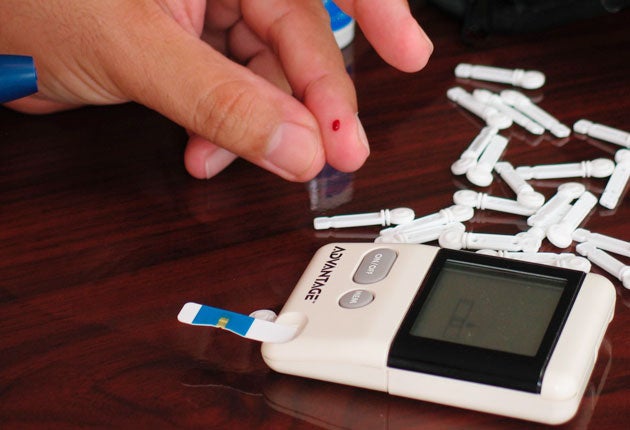NHS resources threatened as diabetes cases soar 70 per cent
British rise in disease linked to obesity and bad diet exceeds Europe and US

A dramatic increase in the number of people diagnosed with diabetes in middle age has been documented by a study exposing the scale of the epidemic that threatens to overwhelm the NHS in the coming decades.
New cases of diabetes in Britain soared by 74 per cent between 1997 and 2003, according to the study, suggesting that poor diet and rising levels of obesity are behind the increase in the hormonal illness, which almost doubles the risk of premature death.
Latest figures suggest that the number of people in Britain developing obesity-related diabetes is rising at a faster rate than in America, where the disease has become one of the biggest killers.
The findings from the study, published last night, support figures published last year suggesting that the number of people newly diagnosed with diabetes has more than doubled from 83,000 in 2006 to 167,000 in 2008. There are now more than 2.2 million people in Britain suffering from the type-2 version of the disease, which is related to sedentary lifestyles and the explosive growth in obesity.
An analysis of figures based on new diagnoses of type-1 and type-2 diabetes found that the type-2 version accounts for almost all of the observed increase in diabetes over the past decade. Type-1 disease is commonly diagnosed in childhood, and is caused by the loss of cells in the pancreas that produce insulin, the hormone that controls levels of sugar in the bloodstream. Type 2, or late-onset diabetes is mainly caused by a growing insensitivity to insulin, and is linked to obesity.
Type-2 disease is usually diagnosed in people over the age of 40, although there are increasing reports of it being diagnosed in younger patients.
In the latest study, scientists analysed the records of a representative group of nearly 93,000 people with diabetes. Nearly 50,000 of the patients already had diabetes, and 42,600 were newly diagnosed with it between 1996 and 2005. Over the 10-year period of the study, there was a 69 per cent increase in the number of cases of type-2 diabetes, with a 74 per cent increase between 1997 and 2003, the scientists said.
Elvira Masso Gonzalez of the Spanish Centre for Pharmacoepidemiological Research in Madrid, who led the study published in the Journal of Epidemiology and Community Health, said that Britain has one of the fastest-growing diabetes epidemics in the world. “Our results suggest that, although the incidence of diabetes remains lower in the UK than in the United States or Canada, it appears to be increasing at a faster pace. I think that the UK is one of the countries where diabetes is increasing faster in comparison to other countries in Europe,” she said.
In 1996, 38 per cent of people newly diagnosed with type-2 diabetes were overweight, and 46 per cent were obese. In 2005, the corresponding figures were 32 per cent and 56 per cent respectively.
Luis Alberto Garcia Rodriguez, one of the co-authors of the Madrid study, said: “Our study confirms that the prevalence and incidence of diabetes have increased in the UK over the past decade. This can be mainly explained by the increase in type-2 diabetes and its probable association with obesity.”
Douglas Smallwood, chief executive of the charity Diabetes UK, said: “This research is a sad indictment of the state of the UK’s health. Sadly, the statistics are not surprising as we know that the soaring rates of type-2 diabetes are strongly linked to the country’s expanding waistline.
“Research shows that losing weight can reduce the risk of developing type-2 diabetes by 58 per cent. It is imperative that we raise awareness of the importance of eating a healthy, balanced diet and doing at least 30 minutes of physical activity a day if we want to make any headway in defusing the diabetes time-bomb.”
Long-term complications of diabetes include foot and leg ulcers, stroke, blindness, kidney problems, heart disease and damage to the peripheral blood vessels. The disease is treated by changes to lifestyle, medication to lower sugar levels in the blood, or by insulin injections in extreme cases.
Subscribe to Independent Premium to bookmark this article
Want to bookmark your favourite articles and stories to read or reference later? Start your Independent Premium subscription today.

Join our commenting forum
Join thought-provoking conversations, follow other Independent readers and see their replies